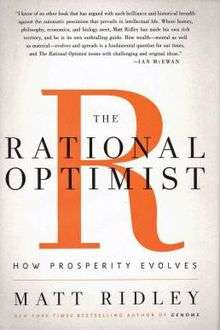The Rational Optimist
 How Prosperity Evolves | |
| Author | Matt Ridley |
|---|---|
| Country | United States |
| Language | English |
| Publisher | Harper |
Publication date | 18 May 2010 |
| Media type | Print (Hardcover) |
| Pages | 448 |
The Rational Optimist is a 2010 popular science book by Matt Ridley, author of The Red Queen: Sex and the Evolution of Human Nature. The book primarily focuses on the benefits of the innate human tendency to trade goods and services. Ridley argues that this trait is the source of human prosperity, and that as people increasingly specialize in their skill sets, we will have increased trade and even more prosperity.[1]
Reception
Bill Gates praised the book for critiquing opposition to international aid, but criticised the book for under-representing Global catastrophic risks.[2] Ricardo Salinas Pliego praised the book as a defence of free trade and globalisation.[3] Michael Shermer gave the book positive reviews in Nature[4] and Scientific American[5] before going on to present similar ideas in conference talks, and writing The Moral Arc partly in response. David Papineau praised the book for refuting "doomsayers who insist that everything is going from bad to worse".[6]
George Monbiot criticised the book in his Guardian column. [7] Critics of the book say it fails to address wealth inequality, and other criticisms of globalization.[8][9][10]
See also
References
- ↑ "Getting better all the time". The Economist. 13 May 2010.
- ↑ Bill Gates (30 Nov 2010). "The Rational Optimist: How Prosperity Evolves".
- ↑ Ricardo B. Salinas (9 Dec 2012). "'The Rational Optimist': Review". Huffington Post.
- ↑ Michael Shermer (20 May 2010). "Science, freedom and trade". Nature. doi:10.1038/465294a.
- ↑ Michael Shermer (1 May 2010). "When Ideas Have Sex".
- ↑ David Papineau (13 June 2010). "The Rational Optimist: How Prosperity Evolves by Matt Ridley". The Observer.
- ↑ George Monbiot. "Matt Ridley's Rational Optimist is telling the rich what they want to hear". The Guardian.
- ↑ William Easterly (11 June 2010). "A High-Five for the Invisible Hand". New York Times.
- ↑
- ↑